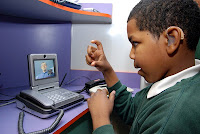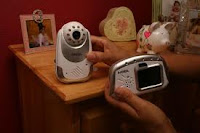 |
| Deaf child using videophone. Image courtesy Listening Bus |
Often I receive questions from people curious about hearing loss regarding how deaf people carry out everyday tasks without the use of sound. With the use of technology, it's increasingly easy! Here are some answers to the most frequently asked "How do deaf people...?":
Deaf people who choose not to use their voices may use IP Relay-- the internet version of the largely outdated Teletypewriter system (TTY), which ran via landline-- through which the deaf person types and the relay operator reads the person's text and transcribes the responses. Now, with videophones, deaf people can also sign what they want to say to a relay interpreter, who will then speak the signed information, and sign the hearing person's response back to the deaf user. Deaf people can also make videophone to videophone calls to one another, and also may communicate in sign language via Skype, FaceTime, or any number of the many video call programs. Deaf people often use smart phones to send text messages, emails, instant messages, or use mobile IP Relay apps for phone communication on the go.
Drive: This question comes up a lot, but there's a relatively simple answer-- deaf people drive just like hearing people drive. After all, we can see. The only difference you may notice is that deaf people may drive with their interior car lights on at night, in order to facilitate communication with passengers.
Wake up in the morning: Some hard-of-hearing people use amplified alarm clocks to wake up in the morning, while deaf people often use either flashing alarm clocks or vibration systems. Vibrating alarm clocks come in several types; some shake the bed, and others are more like vibrating watches worn on the ankle or wrist.
Deal with emergencies: Until recently, calling 911 via relay operator was difficult; emergency operators would hang up on what they thought was a prank call, and the emergency location technology did not work for internet-based calling systems. Fortunately, emergency operators have been trained in how to deal with relay calls, and the FCC has required that internet-based call users keep their updated address on file for use in the event of an emergency. Recently Verizon announced that their plan to provide 911 emergency text messaging service for the deaf, and for those whose danger may increase by calling.
At home, deaf people may have amplified smoke alarms, or use smoke alarms with visual alerts, like a flashing light.
Watch television or movies: Closed captions, which denote the dialogue as well as the relevant background noises [e.g. a knock on the door], in text along the bottom of the screen, allow deaf and hard-of-hearing people to watch and understand television. Unfortunately, much of the online television content is not being captioned, and giants like Amazon Instant Video don't yet provide captions for their downloadable content. However, the US Senate passed a law stating that all content previously aired on TV must have available captions when it appears on the internet, and this is currently being implemented by networks and websites across the country.
For movies, nearly all DVDs now have caption or subtitle options in their main menus. With regard to theaters, many have FM loop systems that connect with a user's hearing aids or cochlear implant, while lower-tech venues might offer headphone sets to amplify sound. Some theaters have special open-captioned showings of one or two movies, in which captions appear on screen much like television. Increasingly, theaters are also adopting closed caption systems like Rear Window, where the captions are reflected off a strip of plastic, so that they are visible only to users with the device. The latest in this vein of technological advancement are the Sony subtitle glasses available in select Regal cinemas. We can't wait to try these out!
 Care for an infant: "How do you know if the baby's crying?" Deaf people often install visual alerting systems in their houses, so that they are made aware of noises-- smoke alarms, doorbells, etc-- by corresponding flashing lights. Visual baby monitors also work this way, and, increasingly (for both deaf and hearing families) video baby monitors are used.
Care for an infant: "How do you know if the baby's crying?" Deaf people often install visual alerting systems in their houses, so that they are made aware of noises-- smoke alarms, doorbells, etc-- by corresponding flashing lights. Visual baby monitors also work this way, and, increasingly (for both deaf and hearing families) video baby monitors are used.Read: Here's another FAQ we don't quite understand, but are happy to answer. Often people confuse sign language users with users of braille. But deaf and hard-of-hearing people read written text just like hearing people do (that is, unless they're blind!)
Have another question about how deaf people deal with the hearing world? Leave a comment or, email us!

I like your post ,now I must complete my research for my paper.
ReplyDeleteMBA Dissertation Service